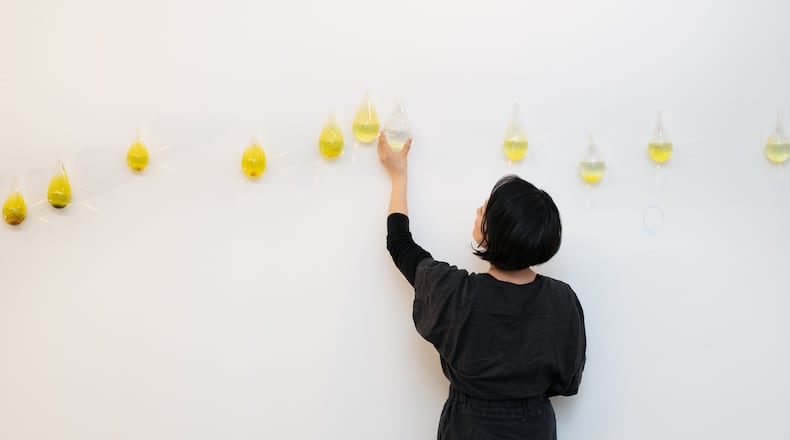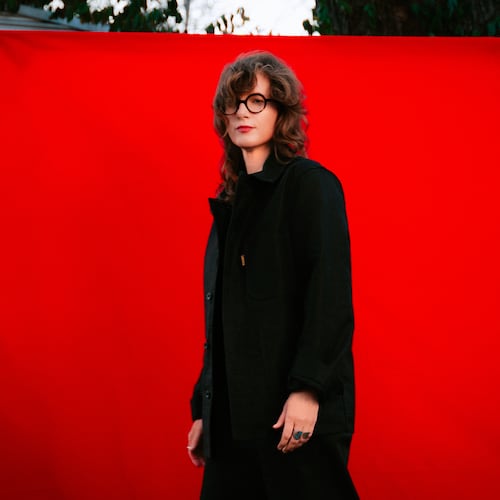This story was originally published by ArtsATL.
What is an artist to do in the face of hate and injustice?
There are, of course, many paths. Kara Walker, for instance, dispenses outrage and discomfort to great effect. At the other end of the spectrum, installation artist Gyun Hur has chosen to channel grief and remembrance as a vehicle for healing.
Credit: Photo by Christina Price Washington; courtesy of the artist and Flux Projects
Credit: Photo by Christina Price Washington; courtesy of the artist and Flux Projects
A sense of loss stemming from her family’s immigration from South Korea to settle in Atlanta when she was 13 has pervaded the former Atlanta artist’s potent abstract art and installation. For “Spring Hiatus” (2011), a performative installation commissioned by Flux Projects in 2011, she and her parents hand-shredded hundreds of silk flowers, the kind commonly laid at grave sites, and laid them in precise stripes on the floor at Lenox Square to re-create her mother’s traditional wedding blanket. It was an act of mourning and repair.
Now living in Brooklyn, Hur has returned to Atlanta with “Our mothers, our water, our peace,” a two-year project commissioned by Flux Projects and executed in Atlanta. Part of “Flow,” a series devoted to Atlanta’s relationship with water, the project will culminate in an installation of 150 teardrop-shaped, handblown glass vessels filled with tinted water in spring 2025. They will be mounted on the walls and ceiling in multiple undulating groupings to create an environment for gathering and meditation.
The current work debuts a more expansive vision than in earlier works. Hur, 41, is attempting to create a platform for communal healing. The catalyst: the murder of six women of Asian descent in a white man’s rampage at Atlanta area spas in March 2021. The tragedy, which became the face of anti-Asian hate crimes that proliferated during COVID, left Hur traumatized and angry. She wondered whether her adopted country could ever really be home. As a mother, she worried for her daughter’s safety. Like so many of her peers in the Asian American community, she urgently felt the need to speak out — to do something.
Up to that point unsure about the exact nature of her future Atlanta project, she found her direction. “I decided I needed to do more than mount an exhibition,” she explains. “The work needed to live among people. The shooting shook our community so deeply. They needed to have a private moment.”
Credit: Photo by Changeyourlife Media; courtesy of the artist, Asian Americans Advancing Justice-Atlanta, and Flux Projects
Credit: Photo by Changeyourlife Media; courtesy of the artist, Asian Americans Advancing Justice-Atlanta, and Flux Projects
To that end, Hur is spending this year conducting workshops on remembrance and affirmation, placing small installations of vessels in community centers, offices and churches, as well as offering individuals a vessel to keep in their homes.
This brings her to the art gallery at the Lawrenceville Arts Center on a sunny Saturday afternoon, sitting in a circle with a small group of workshop participants. They have made artwork using photos of family members and now gather to talk about their art and their families. Sarah Park, a high school friend, has brought her 9-year-old daughter, her mother and her mother-in-law, who shares a large scrapbook of family pictures and memories inspired by them.
It’s a perfect encapsulation of Hur’s hope of binding generations together. She hopes that by honoring elders, acknowledging the sacrifices they made for their children and expressing the anger and hurt they didn’t feel they could express, her generation can stop the cycle of intergenerational trauma.
“I want my daughter to feel lighter,” she says.
The conversation turns to the display of Hur’s on the gallery wall. She explains the origin of the motif, which she developed while recovering from a painful private experience. She was attracted to glass because of its beauty and its paradoxical capacity to hold fragility and strength. The teardrop shape was, of course, a reference to her pain. Her decision to fill them with river water (now tinted symbolic yellow and brown) was inspired by time spent by the Delaware River, which, she says, was “teaching me about grief, healing, letting go.”
Water put her in mind of happy memories as well — of playing in the river beside her mother who washed clothes in Korea and the role church played in her family life. She mentioned the healing power of baptism and the power of the song “I’ve Got Peace Like a River,” an African American spiritual she sang in church both in Korea and in Georgia. The undulant composition of the vessels in Lawrenceville mimics the musical arrangement of the song.
Credit: Photo by Changeyourlife Media
Credit: Photo by Changeyourlife Media
Hur has also placed an installation of 15 vessels at the Asian American Advocacy Fund, where Nicole Kang, an old high school friend, works. The project certainly speaks to Kang, whose journey parallels Hur’s. “We both have young daughters. We both are artists. We both explore our histories to find a sense of wholeness,” she says.
As with Hur, the spa shooting was a catalyzing moment, a call to be more outspoken. “Atlanta is not a great place to be,” Kang allows. “A lot of Georgia policies are harmful to us, and there is anti-immigrant sentiment. To constantly have to validate your humanity is exhausting.”
Having the vessels in her office seems to have been the antidote Hur intended. Kang explains: “We got to fill the vessels together. It was a very touching moment for us — a bonding experience. We felt renewed.”
This is, in its way, a project about hope. “It’s about grieving and remembering and trying to believe we can live together,” Hur says. “You have to go through grief to experience joy.”
::
Catherine Fox, an award-winning art critic, cofounded ArtsATL and served as its executive director and executive editor for five years. Fox was the art critic for The Atlanta Journal Constitution from 1981 to 2009.
Credit: ArtsATL
Credit: ArtsATL
MEET OUR PARTNER
ArtsATL (artsatl.org) is a nonprofit organization that plays a critical role in educating and informing audiences about metro Atlanta’s arts and culture. ArtsATL, founded in 2009, helps build a sustainable arts community contributing to the economic and cultural health of the city.
If you have any questions about this partnership or others, please contact Senior Manager of Partnerships Nicole Williams at nicole.williams@ajc.com.
About the Author
Keep Reading
The Latest
Featured







